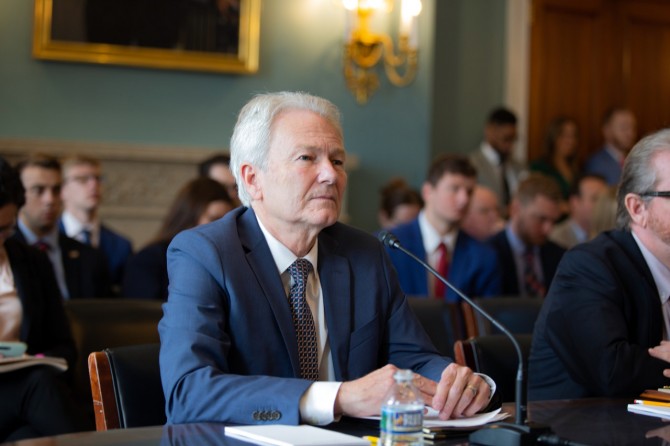Wolfe offers ag fixes to ‘complex, severe’ climate change
By Blaine Friedlander
David Wolfe, professor in the School of Integrative Plant Science (SIPS), told a congressional committee in a hearing on agricultural resiliency that climate change impacts have been more complex and severe than scientists had forecast three decades ago. He called for more technology solutions.
“Climate models have projected for years an increase of both drought and flooding risk for many regions. But, the severity of recent flooding impacts has left many areas unprepared,” Wolfe told the U.S. House Subcommittee on Biotechnology, Horticulture and Research June 12 in Washington.
“Many farmers now in the Midwest are suffering from record-breaking spring flooding that has delayed planting to the point where the growing season will be a total loss,” he said. “This is what concerns farmers the most: extreme weather events that are more frequent and more catastrophic than previous generations have had to face.”
Wolfe, saying farmers need support from Washington, advocated for investments to provide longer-term seasonal climate forecasts, create new environmental monitoring systems linked with data analytics for field-level management, and expand adoption of soil health practices.
Wolfe answered questions from House members, including Rep. T.J. Cox, D-California, who asked Wolfe about the role that agricultural research plays in addressing climate-change challenges and how to best share that information with farmers. Wolfe said there is a need for permanence of funding for regional centers where farmers know they can obtain that information reliably. Farmers, he said, need cutting-edge tools being created by land-grant universities and U.S. Department of Agriculture resources.
Rep. James Baird, a Republican from Indiana, touted the benefits of agricultural research and cited the work of late Nobel laureate Norman Borlaug, who taught at Cornell as an A.D. White Professor-at-Large from 1982-88. Baird wanted to know if the U.S. could fall behind other countries in developing agriculture technology. Wolfe noted that while other countries have improved agricultural technology, “our [national cooperative extension] system is still excellent here and we have a lot going for us.”
Rep. Glenn Thompson, R-Pennsylvania, asked Wolfe to comment on the role of cover crops and retaining soil health. Wolfe said if organic matter is depleted in soils, planting cover crops is a key way to rebuild it, and they also reduce soil erosion during heavy rain events.
“Every farmer today is interested in rebuilding soils,” he said. “[Healthy soils] can reduce input costs, build resilience to drought and flooding, and also sequester carbon.”
Wolfe – a faculty fellow at Cornell’s Atkinson Center for a Sustainable Future – took the opportunity during the questioning with Rep. Kim Schrier, D-Washington, to mention Adapt-N, an agricultural technology developed at Cornell that can help farmers cope with climate change. Adapt-N is a precision nitrogen management solution created by Harold van Es, professor of soil and water management in SIPS, and Jeff Melkonian, senior research associate.
Wolfe told the subcommittee that many U.S. farmers are already beginning to adjust to a less-predictable climate. “With sustained major investments in research and extension, and policies that facilitate adaptive management,” he said, “farmers will be better prepared to meet the challenges and take advantage of any opportunities that a changing climate may bring.”
Media Contact
Get Cornell news delivered right to your inbox.
Subscribe

